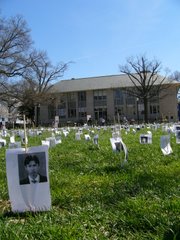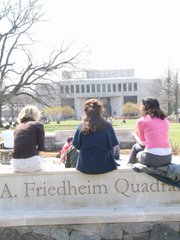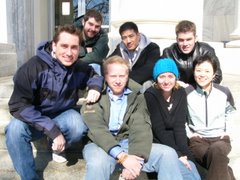As an SIS graduate student, you have lots of academic choices. Choosing whether to write a master’s thesis or another type of capstone work is one of them. Many people thinking about grad school wonder, “Do I have to come knowing what I’m going to write my thesis on?” The answer at SIS is no—but if you have an idea, great, if not you’ll find it while you here!
I’m not an academic guidance counselor, but I made the choice between an Significant Research Project (SRP) and thesis, as everyone else at SIS does. This blog is what I feel might be useful for those of you choosing a grad program or stressing about thesis.
The Technical Note: For the vast majority of SIS master’s programs you may complete either: 1. a substantial research paper (SRP) for 3 credits and a 3-credit internship, 2. a 6-credit thesis, or 3. a 6-credit research practicum. People choose SIS for graduate school for many reasons, and the research and writing requirement allows you to accomplish your own goals. In my last semester, I am taking a 3 credit internship and writing an SRP.
Roughly, the master’s thesis involves an 80-100-page paper representing an original contribution to the literature existing on your topic, the coursework is spread out over two (or more) semesters and accompanied by an oral defense at the end.
The Personal Note: I chose the International Communication program due the professional nature of the program, and writing an SRP and taking an internship for credit met my professional goals. I used the internship requirement (work in a field related to your academic coursework) to take time during this semester to explore a career I am interested in after graduation—I’m currently a government and public affairs intern at MWW and writing my SRP on the corporate sector’s contribution to public diplomacy in Eastern Europe.
If you’re really good, you might also be able to directly connect your internship and SRP. For instance, if you are working for an NGO and your job is to track and report on the recent democratic uprising in
I had a good idea of what I was interested in when I started at SIS, however, I had no clue as to what topic I wanted to devote myself to researching for my SRP until recently. Professors, especially in the International Communication program, encourage you to find your knowledge niche—an area/topic that you can explore in your class research projects and papers and develop as your base of expertise. The majority of paper topics are open, and you can test out your depth of interest in an area in many courses before you decide what it is that you’re passionate about before you commit to developing around 70 pages on it. And the SIS graduate academic advisors are always available to help you figure things out.
Bottom line is you don’t need to stress about what you’re going to write about, you just need to be motivated to explore.
Happy Academic Travels,
Kate
Master’s Candidate 2008
International Communication
Knowledge Niche: Public Communication & Eastern Europe





